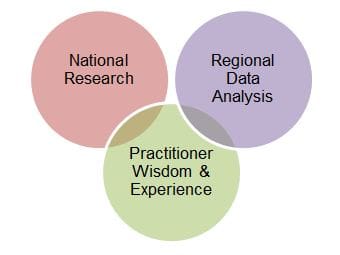The effective translation of data and information into a cohesive and efficient guide to improved education outcomes requires a set of integrated data and information systems and the ability to effectively use those systems. With its Central Texas Educational Research System, E3 Alliance is a leading provider of trusted, objective information. We are currently the backbone for a Collective Impact initiative in Central Texas. Our work requires using a data-driven approach to aligning education systems to help educators better meet the needs of and increase educational outcomes for every student. This requires not only complex academic research, but also in-depth data analysis designed to enlighten and inform the public and our education partners about trends and outcomes in schools. Our partner school districts and higher education institutions depend on E3 to help them conduct research to:
- Evaluate progress toward the goals of The Blueprint for Educational Change, our regional strategic plan
- Track educational trends
- Improve understanding of the impact of educational programs
- Identify best practices
Since our launch in 2006, E3 Alliance’s approach to data and research stems from the following principles:
- Data is critical because it frames the conversation and prevents dialogue from devolving into diatribe
- Conducting research and data analysis can be used as a form of stakeholder engagement and a way to both customize practice to the region and help ensure broad commitment to shared measures
- By modeling the way we want all stakeholders to use data and action research, we help to change the culture to be driven by high expectations and student outcomes
We have found that the most powerful action research combines national and regional, objective and subjective information.
We define Action Research as the provision of timely data used to influence decisions and practices to increase student outcomes, and ultimately change systems. How does this Action Research work in practice? One example is in the study of “bright spots” practices for English Language Learners.
We started with regional data analysis, identifying demographic trends in our region. Over the last decade, our student population has grown at over twice the rate of the state overall, which is already the fastest growing state in the nation. Particular populations of high need, such as our English Language Learners (ELLs), have grown at 2.5 times the already exploding regional student population. Yet data collected from our collaborating partner school districts revealed that there is almost no consistency in policies or practices for the instruction of this critical population.
Next, conducting a review of national research, we identified what we believe to be the strongest statistical methodology in the nation for evaluating student academic growth and applied that algorithm to every student in the state of Texas to identify standout schools in our region. Using this model, we identified eight schools that are demonstrating at least average growth of students overall and high academic growth for their ELL populations, indicating that they are rapidly closely achievement gaps. Then, to develop a thorough understanding of practitioner wisdom and experience within the eight schools, we undertook intensive qualitative studies, including observations, surveys, and interviews with principals, staff, teachers, and parents to identify replicable “bright spot” practices that are contributing to student growth, and looked for strong patterns across our study schools. In late April we will roll out the results of this Action Research to educators across the region to help replicate practices that can eliminate gaps and accelerate learning for our ELL students.
The education system in Texas is widely understood to be data-rich, but because that data is rarely accessible or usable, it is also information-poor. By transforming a wealth of often inaccessible, hard to understand, and conflicting data into useful information for decision-making, E3 Alliance continues to have a broad and deep impact on schools and students.
To see more about how this works in action, join E3 Alliance at a webinar hosted by the Michael and Susan Dell Foundation on April 16th, Noon-1pm ET.
Topic: Show Me the Data: The Power of Data in Driving Education Change
Date: Tuesday, April 16th, 2013 at 12:00pm Eastern Daylight Time
Shawn Thomas is the Director of Research at E3 Alliance.
About E3 Alliance – E3 Alliance is a regional, data-driven education collaborative based in Austin, Texas. We believe that only through greater education achievement for our current and future generations of children, can Central Texas realize economic prosperity and a high quality of life for our community. Such education achievement requires systemic change from cradle to career, and that is our commitment to our community. To learn more, visit www.e3alliance.org.

